September 17, 2020
by Carole Zangari -
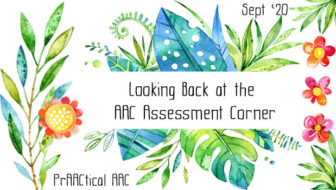
It’s Throwback Thursday and today we’re turning our attention to assessment. Take a look at these posts from our AAC Assessment Corner series guest authored by Vicki Clarke. Evaluating Skills For the Use of Comprehensive AAC Systems – Core Word Use Ready, SETT, AAC Evaluate! AAC Skills Assessment for Direct Selectors Standardized Tests For AAC Users AAC Assessment for Emergent Communicators The Eyes Have It-Assessment Considerations for High Tech Eye Gaze Access Is AAC Feature Matching Still Relevant? Thinking Inside the Box for AAC Evaluations Procedural Resources Evaluating Skills for Use of Comprehensive AAC Dynamic Display SGDs Language Representation Elements – Noun Symbol Use for Functional Communication
Filed under: Featured Posts, PrAACtical Thinking
Tagged With: AAC assessment
September 14, 2020
by Carole Zangari -

Welcome to Year 2 of the TELL ME About It series, guest authored by Jeanna Antrim and Maggie Judson. For the past year, they’ve written monthly articles to discuss how they support preschool teachers who are implementing the TELL ME program with their young students. Maggie and Jeanna are speech-language pathologists who work in the Assistive Technology Department for the Belleville Area Special Services Cooperative (BASSC) in southern Illinois. They are AT/AAC facilitators and provide evaluations, direct therapy, consultations, and trainings with school teams. In Year 1 of this series, Jeanna and Maggie focused on the 11 books in the TELL ME program. In each of those posts, they shared a lesson plan, activity suggestions, video demonstrations, and much more. You can see their previous posts in the TELL ME About It series below. Max’s Breakfast If You’re Angry and You Know It The Lunch Box Surprise Come Out and Play, Little... [Read More...]
Filed under: Featured Posts, PrAACtical Thinking
Tagged With: core vocabulary, predictable chart writing, reading, TELL ME
September 13, 2020
by Carole Zangari -
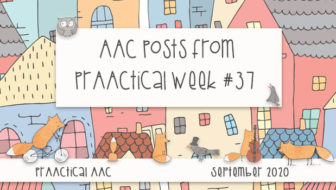
Happy Sunday, AAC friends. Here are some posts that you may have missed in your busy week. Monday – Supporting Young AAC Teams: 5 Considerations for Facilitating Growth Tuesday – AAC Link Up Wednesday – Video of the Week – AAC Device Mounting Fundamentals Thursday – Growing AAC Professionals: Resources for Mythbusters ::::::::::::::::::::::::::::::::::::::::::::::::::::::::::::::::::::::::::::::::::::::::::::::::::::::::::::::::::::::::::::::::::: Still have time for a bit more? Here’s a sampling of past posts for you to browse. PrAACtically Reading with Karen Natoci: Apples AAC Partner Training Strategies AACtual Therapy: From PECS to iPad with Jason Butcher 5 Things We’ve Learned from Our AAC Families Understanding and Supporting Families of AAC Learners
Filed under: Featured Posts, PrAACtical Thinking
September 10, 2020
by Carole Zangari -
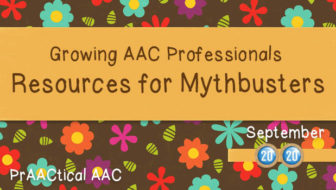
We’re excited to have another guest post today by Vicki Haddix, an AAC SLP and Clinical Assistant Professor at the University of Memphis. Vicki joins us periodically to share some of the work completed by her SLP graduate students. Under her leadership, they create videos, handouts, and other materials that can be used by families, clinicians, and educators. Let’s take a look. ::::::::::::::::::::::::::::::::::::::::::::::::::::::::::::::::::::::::::::::::::::::::::::::::::::::::::::::: As I have said in previous posts about teaching the graduate class on AAC, I find Universal Design for Learning (UDL) to be a very helpful framework when designing the course, although I’ve realized I don’t typically name UDL when I discuss activities or assignments. But I was thrilled when Lindsey Hull came to me wanting to look at integrating students who use AAC within the general education classroom, and we got to talk about UDL. She put together a narrated PowerPoint full of great ideas for... [Read More...]
Filed under: Featured Posts, PrAACtical Thinking
Tagged With: & Tools, Checklists, forms, myths, videos, visual supports
September 7, 2020
by Carole Zangari -

We’ve all been there. An AAC user enters a new situation where the team is open to AAC but not very skilled. They are full of good intentions but their AAC knowledge and skills aren’t quite there yet. To be honest, they probably are somewhat wary of what we’re expecting them to do as it all seems so overwhelming. And in many cases, they’re also fearful of our judgment and worry about looking less than competent in front of others. We’re eager to help them get up to speed so that they can provide the AAC supports that our communicators need in order to flourish. Our own AAC skills are strong but we may have constraints of a different type that threaten to undermine the success of this budding AAC team. For example, we often feel the pressure of time and hear the tick-tock of the clock as each second... [Read More...]
Filed under: Featured Posts, PrAACtical Thinking
Tagged With: Teaming & Collaboration
September 6, 2020
by Carole Zangari -
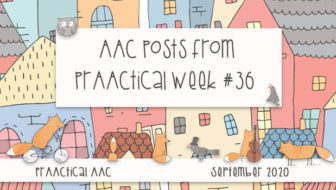
Happy Sunday, AAC friends. It was a busy time for us with two exciting additions to the PrAACtical AAC family: the launch of our SCHOOL Year of Core Vocabulary Words series and the introduction of some Spanish content. So while you are enjoying this beautiful weekend, check out some of the posts you may have missed. Monday – School Year of Core Vocabulary Words: AAC Resources for Month 1 (August) by Michaela Sullivan, Alisa Lego, & Beth Lytle Tuesday – AAC Link Up Wednesday – Video of the Week: Report Writing Tips for AAC Device Funding Thursday – Growing AAC Professionals: AAC-friendly Books Friday – PráctiCAAmente Conectados Con Links ::::::::::::::::::::::::::::::::::::::::::::::::::::::::::::::::::::::::::::::::::::::::::::: If you have time for a bit more browsing, here are some posts you can explore. AAC Printables The Crust of AAC Every Second Counts Goodbye, Summer! A Clinician Prepares for a New School Year 3 Ways to Use AAC... [Read More...]
Filed under: Featured Posts, PrAACtical Thinking
September 3, 2020
by Carole Zangari -
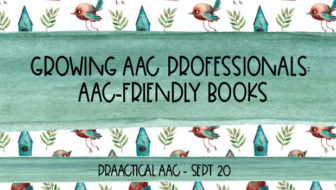
Today, we welcome back Vicki Haddix to these pages. Vicki is an AAC SLP who has had a variety of experiences and is currently a Clinical Assistant Professor at the University of Memphis. She joins us periodically to share some of the fine work that her graduate students. In today’s post, Vicki shares the work of students who created AAC-friendly books and other resources on important topics, like water safety. You can learn more from Vicki and her students here. Make sure to check out the link at the bottom to access the full array of materials that these talented students created. Enjoy! :::::::::::::::::::::::::::::::::::::::::::::::::::::::::::::::::::::::::::::::::::::::::::::::::::::::::::::::::: As a professor, it’s always exciting when you see the great work that graduate students are doing and think about the potential that they are bringing to the field. I’ve taught the AAC class at the University of Memphis’s SLP graduate program for 5 spring semesters.... [Read More...]
Filed under: Featured Posts, PrAACtical Thinking
Tagged With: Accessible Books & Materials, Bilingual AAC & Multilingualism, preservice training, Tarheel Reader
August 31, 2020
by Carole Zangari -
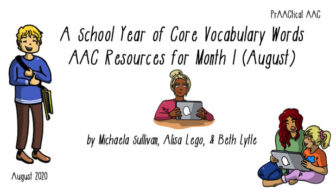
August may be on the way out but the words for this month are useful all throughout the year. The new Year of Core Words School Edition is in development and the plan is to get these monthly to you prior to the start of each month so that you can plan and prepare. Please bear with us for the first few posts as we get up to speed. Each of the monthly posts will highlight a selected set of words and a suggested order in which to teach them. You’ll also find resources, such as Activity Sheets for each word and data collection forms, and information on a key intervention strategy. The series authors, Michaela Sullivan, Beth Lytle, and Alisa Lego, created an introduction that you may want to review before digging into this month’s target words. You can see that here. Enjoy Month 1 of the School Year... [Read More...]
Filed under: Featured Posts, PrAACtical Thinking
Tagged With: A Year of Core Vocabulary Words, Education & Schools
August 30, 2020
by Carole Zangari -
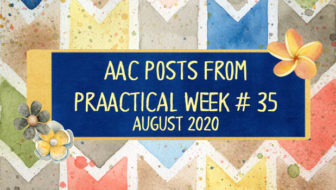
Another week is in the books and it sure was a busy one. Here are a few posts to browse through before we turn the page to September. Monday – PrAACtically September: AAC Resources for A Year of Core Vocabulary Words (Remote or In-person Learning) Tuesday – AAC Link Up Wednesday – Video of the Week: Visuals, Timers, & Zoom Thursday – How I Do It-Strengthening our Remote AAC Sessions Saturday – PrAACtical Introductions: Meet…A Year of Core Vocabulary Words – School Edition :::::::::::::::::::::::::::::::::::::::::::::::::::::::::::::::::::::::::::::::::::::::::::::::::::::::::::::::::::::::::::::: If you have time for a bit more browsing, here are some posts you can explore. AAC Printables The Crust of AAC Every Second Counts Goodbye, Summer! A Clinician Prepares for a New School Year 3 Ways to Use AAC Goals to Strengthen Implementation
Filed under: Featured Posts, PrAACtical Thinking
Tagged With: downloads
August 29, 2020
by Carole Zangari -
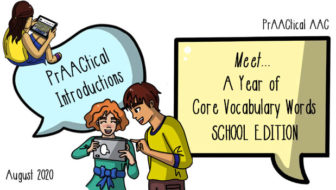
Much has changed since we first wrote about the Year of Core Vocabulary Words and began publishing monthly word lists, symbol cards, activity ideas, and book suggestions. It is gratifying to see the concept and these resources being used by teachers, clinicians, and parents. Today, we introduce an expansion of that concept with a specific focus on school-based AAC support. Say hello to the School Year of Core Words series. Conceptualized and created by AAC SLP Michaela Sullivan, and two pre-professional SLP students, Beth Lytle and Alisa Lego, the series begins with this introduction to the Level 1 and Level 2 words, and some information about what to expect as the series progresses. It will be followed by monthly posts with ideas, resources, and materials. The series follows a US academic calendar, running from August through June. You can learn more about the School Year of Core Word series creators,... [Read More...]
Filed under: Featured Posts, PrAACtical Thinking
Tagged With: A Year of Core Vocabulary Words, Education & Schools









